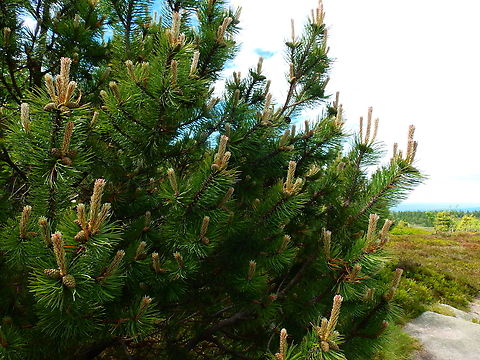
Appearance
The tree has dark green leaves in pairs, 3–7 centimetres long.The cones are nut-brown, 2.5–5.5 cm long.
Distribution
"Pinus mugo" is native to the subalpine zones of the Pyrenees, Alps, Erzgebirge, Carpathians, northern and central Apennines, and higher Balkan Peninsula mountains – Rila, Pirin, Korab, Accursed Mountains, etc. It is usually found from 1,000–2,200 m, occasionally as low as 200 m in the north of the range in Germany and Poland, and as high as 2,700 m in the south of the range in Bulgaria and the Pyrenees. Also in Kosovo it is found in the Bjeshkët e Nemuna National Park.In Scandinavia, Finland and the Baltic region, "P. mugo" was introduced in the late 1700s and the 1800s, when it was planted in coastal regions for sand dune stabilization, and later as ornamental plants around residences. In Denmark, Norway and Sweden, the species has naturalised and become invasive, displacing fragile dune and dune heath habitats. In Estonia and Lithuania "P. mugo" only occasionally naturalises outside plantations, sometimes establishing in raised bogs.
Habitat
"Pinus mugo" is classed as a wilding conifer, and spreads as an invasive species in the high country of New Zealand, coastal Denmark, and other areas of Scandinavia.Uses
A recent trend is the increase in use of the mugo pine in cooking. Buds and young cones are harvested from the wild in the spring and left to dry in the sun over the summer and into autumn. The cones and buds gradually drip syrup, which is then boiled down to a concentrate and combined with sugar to make pine syrup.The syrup is usually sold as "pinecone syrup"
or "pine cone syrup".
References:
Some text fragments are auto parsed from Wikipedia.